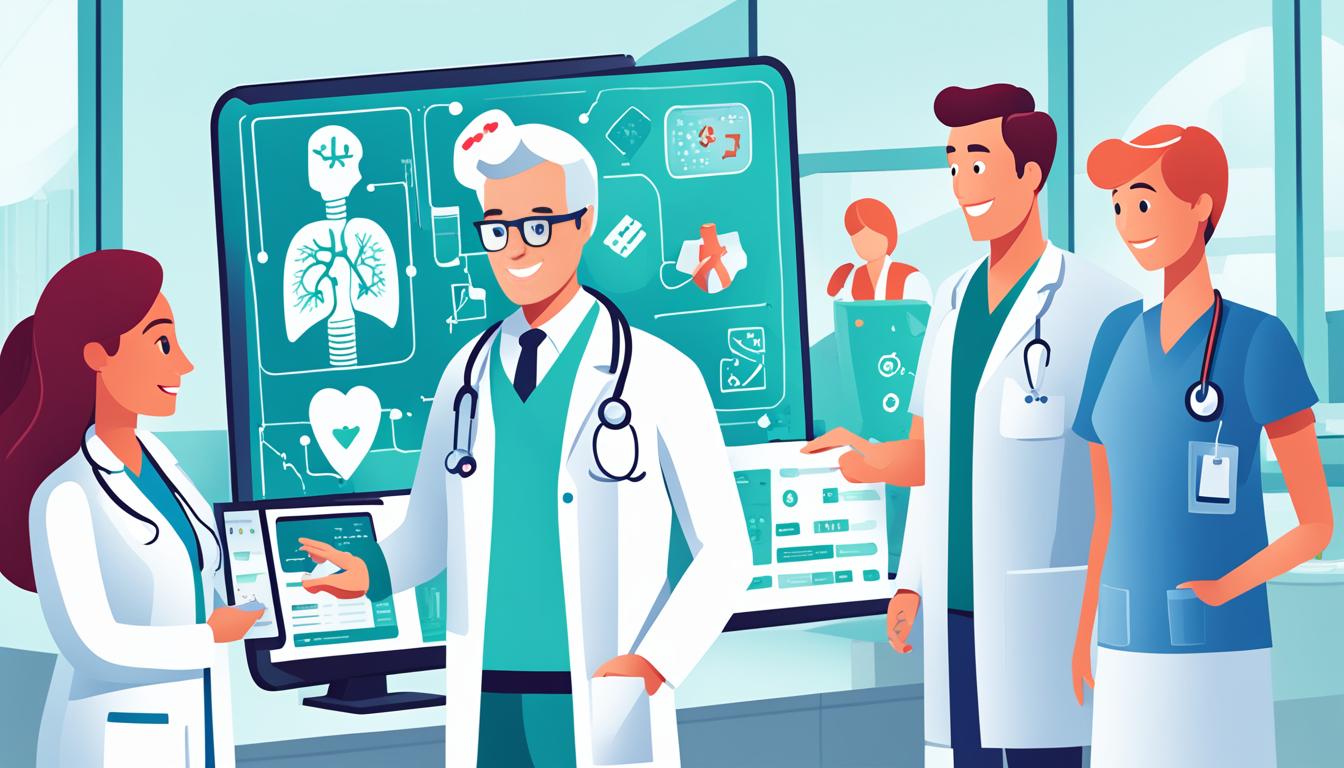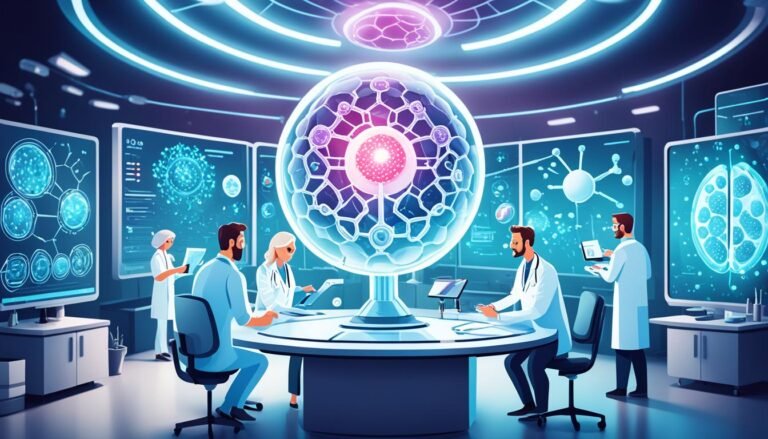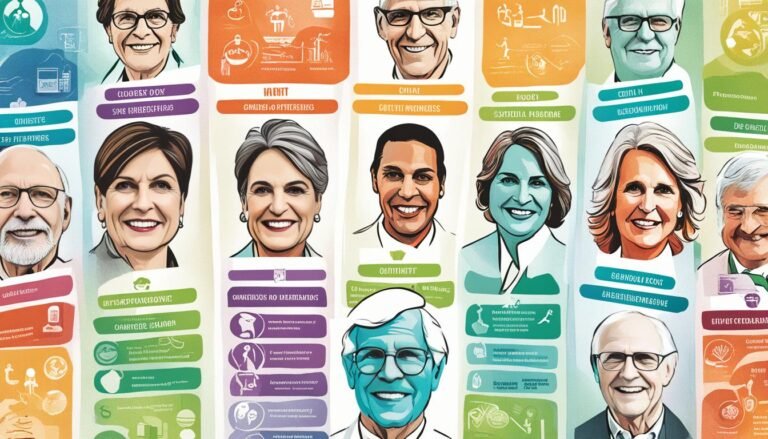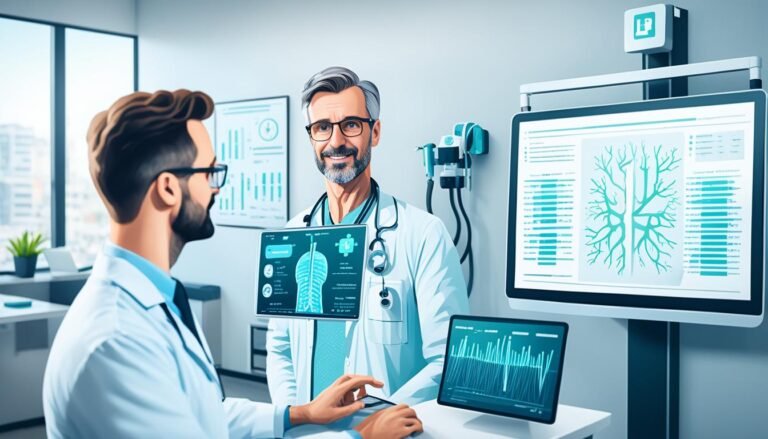Did you know that the global market for AI in healthcare is projected to reach $45.2 billion by 2026? This staggering statistic highlights the rapid growth and immense potential of Artificial Intelligence (AI) and the Internet of Things (IoT) in revolutionizing the healthcare industry. The convergence of these technologies is transforming smart healthcare systems, leading to improved patient care, enhanced clinical efficiency, and significant cost savings.
Key Takeaways:
- AI and IoT are driving the digital transformation of the healthcare industry.
- Smart healthcare systems integrating AI and IoT enable remote patient monitoring and personalized treatment plans.
- The convergence of AI and IoT in healthcare improves patient outcomes, reduces costs, and enhances operational efficiency.
- Data security, privacy concerns, and interoperability are among the challenges in AI and IoT integration.
- The future of AI and IoT in healthcare holds immense potential for advancements in personalized medicine and improved healthcare outcomes.
The Role of AI and IoT in Healthcare
The integration of Artificial Intelligence (AI) and the Internet of Things (IoT) has revolutionized various aspects of healthcare, playing a crucial role in transforming the industry. By leveraging AI technologies, healthcare providers can analyze and interpret vast amounts of medical data, leading to accurate diagnoses and personalized treatment plans. IoT devices, on the other hand, enable real-time monitoring and data collection, facilitating remote patient monitoring, preventive care, and early intervention.
AI in healthcare technology has empowered healthcare professionals with advanced analytics and processing capabilities that were previously unimaginable. The ability to harness AI algorithms allows healthcare providers to extract valuable insights from patient data, enabling them to make informed decisions and deliver targeted healthcare services. By utilizing AI, healthcare organizations can enhance patient outcomes, improve clinical efficiency, and optimize resource allocation.
Moreover, IoT in healthcare technology has significantly improved patient care and safety. IoT devices, such as wearables and remote monitoring devices, enable continuous real-time data collection, empowering healthcare providers to remotely monitor patients’ vital signs, detect anomalies, and take prompt actions. With IoT in healthcare, preventive care and early interventions have become more feasible, resulting in better patient outcomes and reduced healthcare costs.
AI and IoT innovations are reshaping the healthcare industry, empowering healthcare professionals with unprecedented capabilities to provide personalized care, enhance patient safety, and optimize clinical workflows.
The integration of AI and IoT in healthcare holds tremendous potential for the future. Through AI-powered algorithms and IoT devices, healthcare organizations can unlock novel insights that drive advancements in disease prevention, diagnostics, and treatment. The continuous development and refinement of AI and IoT technologies will pave the way for smarter healthcare systems that are patient-centric, efficient, and accessible.
| Benefits of AI in Healthcare | Benefits of IoT in Healthcare |
|---|---|
| Accurate diagnoses | Real-time monitoring |
| Personalized treatment plans | Data collection for preventive care |
| Improved patient outcomes | Early intervention |
| Enhanced clinical efficiency | Remote patient monitoring |
| Cost savings | Optimized resource allocation |
With the convergence of AI and IoT, healthcare technology is poised for significant advancements. The future of healthcare will witness further integration of intelligent systems, data-driven decision-making, and the adoption of innovative smart healthcare solutions. Together, AI and IoT can drive the digital transformation of the healthcare industry, ushering in an era of improved patient care, optimized workflows, and sustainable healthcare systems.
Applications of AI and IoT in Healthcare
AI and IoT have revolutionized various aspects of the healthcare industry, offering a multitude of applications that enhance patient care, diagnosis, and treatment. By combining the power of artificial intelligence with the connectivity of the Internet of Things, innovative smart healthcare solutions have emerged. These solutions leverage AI and IoT technologies to transform healthcare delivery, enabling healthcare providers to deliver personalized and efficient care.
Remote Patient Monitoring
One of the key applications of AI and IoT in healthcare is remote patient monitoring. IoT-enabled devices such as wearables, home monitoring systems, and implantable sensors collect real-time data on patients’ vital signs, medication adherence, and lifestyle habits. This data is then transmitted to healthcare providers, allowing them to remotely monitor patients’ health status and intervene promptly when necessary. Remote patient monitoring provides continuous care, reduces hospital readmissions, and improves patient outcomes.
Diagnosis and Treatment
AI algorithms play a crucial role in analyzing medical data and aiding in the diagnosis and treatment of various diseases. By leveraging AI’s computational power, healthcare providers can quickly analyze vast amounts of patient data, including medical images, electronic health records, and genomic information. This analysis enables the early detection of diseases, assists in accurate diagnoses, and helps healthcare professionals formulate personalized treatment plans tailored to individual patients.
Predictive Analytics
A significant advantage of combining AI and IoT in healthcare is the ability to leverage predictive analytics. AI algorithms analyze large volumes of healthcare data to identify patterns, trends, and risk factors. By employing predictive analytics, healthcare organizations can anticipate healthcare trends, forecast disease outbreaks, optimize resource allocation, and improve overall operational efficiency. This data-driven approach enables healthcare providers to make informed decisions, improve patient care, and enhance population health management.
Overall, the applications of AI and IoT in healthcare are extensive and continue to expand. Through remote patient monitoring, diagnosis and treatment assistance, and predictive analytics, AI and IoT technologies are enabling healthcare organizations to deliver more personalized, efficient, and proactive care. The integration of AI and IoT in healthcare has the potential to revolutionize patient care, improve clinical outcomes, and optimize resource utilization.
Benefits of AI and IoT in Healthcare
The integration of AI and IoT in healthcare brings numerous benefits, revolutionizing the way patient care is delivered and improving clinical efficiency. Here are the key advantages of incorporating AI and IoT technologies in smart healthcare systems:
1. Enhanced Patient Care
Smart healthcare systems enable remote patient monitoring, allowing healthcare providers to keep track of patients’ vital signs, medication adherence, and overall health status in real-time. This constant monitoring reduces the need for frequent hospital visits and improves patient comfort. AI algorithms can analyze the collected data and provide healthcare professionals with valuable insights, enabling them to make more accurate diagnoses, create personalized treatment plans, and provide proactive care.
2. Improved Clinical Efficiency
The use of AI and IoT devices in healthcare automates routine tasks and optimizes resource allocation, leading to improved clinical efficiency. AI-powered algorithms can process and analyze vast amounts of medical data, allowing healthcare professionals to focus on higher-level decision-making. This streamlines workflows and reduces administrative burden, freeing up valuable time that can be dedicated to patient care. With smart healthcare systems, healthcare providers can deliver more efficient and precise healthcare services.
3. Cost Savings
Implementing AI and IoT technologies in healthcare can result in significant cost savings for healthcare organizations. By reducing the number of hospital visits through remote patient monitoring, healthcare facilities can save on resources such as beds, staff hours, and medical supplies. Additionally, AI-driven predictive analytics can assist in optimizing resource allocation, thereby reducing wastage and improving cost-efficiency. The adoption of AI and IoT technologies enables healthcare providers to deliver high-quality care while also reducing operational expenses.
By harnessing the power of AI and IoT, smart healthcare systems offer immense benefits for both patients and healthcare organizations. The integration of these technologies improves patient care, enhances clinical efficiency, and enables cost savings, ultimately transforming the healthcare industry.
Challenges and Considerations in AI and IoT Integration
The integration of AI and IoT in healthcare presents several challenges and considerations that need to be addressed for successful implementation. These challenges include data security, privacy concerns, ethical considerations, and interoperability.
Data Security
One of the primary challenges in AI and IoT integration is ensuring data security. The collection and transmission of large amounts of sensitive medical data increase the risk of data breaches and unauthorized access. Healthcare organizations must implement robust data security measures, such as encryption, access controls, and secure storage, to protect patient privacy and maintain data integrity.
Privacy Concerns
The use of AI algorithms and IoT devices in healthcare raises concerns about patient privacy. The extensive monitoring and collection of personal health data may infringe on individuals’ privacy rights. It is crucial to establish protocols and policies that address privacy concerns and ensure patients have control over their personal health information.
Ethical Considerations
AI algorithms and IoT devices have the potential to make decisions that have ethical implications. For example, AI algorithms may prioritize certain patient populations or treatments, leading to bias and inequities in healthcare. Ethical guidelines and standards should be developed to ensure the responsible and fair use of AI and IoT technologies in healthcare, taking into account the impact on patient outcomes and the wider healthcare ecosystem.
Interoperability
The healthcare industry relies on diverse systems and technologies, making interoperability a significant challenge in AI and IoT integration. Different systems must work together seamlessly to share data and communicate effectively. Achieving interoperability requires the development of standardized protocols and interfaces to enable the seamless exchange of information between different AI and IoT solutions.
Addressing these challenges and considerations is essential to fully harness the potential of AI and IoT in healthcare. By implementing robust data security measures, addressing privacy concerns, establishing ethical guidelines, and promoting interoperability, healthcare organizations can overcome these challenges and embrace the transformative benefits that AI and IoT integration offers.
Table: Comparative Overview of Challenges and Considerations in AI and IoT Integration
| Challenges | Considerations |
|---|---|
| Data Security | Implement robust security measures, such as encryption and access controls, to protect sensitive medical data. |
| Privacy Concerns | Establish protocols and policies to address privacy concerns, giving patients control over their personal health information. |
| Ethical Considerations | Develop ethical guidelines and standards to ensure responsible and fair use of AI and IoT technologies in healthcare. |
| Interoperability | Promote the development of standardized protocols and interfaces to enable seamless data exchange between different systems. |
Future Trends in AI and IoT in Healthcare
The future of AI and IoT in the healthcare industry holds great promise for further advancements. As technology continues to evolve, AI algorithms will become increasingly sophisticated, enabling more accurate diagnoses, predictive analytics, and personalized treatment plans. This will revolutionize patient care and improve healthcare outcomes.
The Internet of Medical Things (IoMT) will also expand, with a greater number of connected devices and sensors enabling real-time monitoring and data collection. This interconnected network of devices will provide healthcare professionals with valuable insights into patient health and enable more proactive and timely interventions.
The integration of AI and IoT in healthcare will drive the digital transformation of the industry. It will optimize healthcare processes, leading to increased efficiency and cost savings. The use of AI-powered algorithms will streamline administrative tasks, enhance resource allocation, and improve operational efficiency.
Enhancing Diagnostics and Treatment
One of the future trends in AI and IoT in healthcare is the enhancement of diagnostics and treatment through the use of intelligent algorithms. AI systems will be able to analyze vast amounts of medical data, including patient records, test results, and genomic information, to provide accurate diagnoses and personalized treatment recommendations.
“The integration of AI and IoT technologies in healthcare will transform the way we diagnose and treat diseases. With the power of AI algorithms and the connectivity of IoT devices, we will be able to deliver precise and targeted healthcare interventions, ultimately improving patient outcomes.”
Advancing Remote Patient Monitoring
Another future trend is the advancement of remote patient monitoring. IoT devices and sensors will play a crucial role in collecting real-time health data from patients in their own homes. This data can then be analyzed by AI algorithms to detect early warning signs of deteriorating health and facilitate timely interventions.
Remote patient monitoring will give healthcare providers a comprehensive view of a patient’s health, allowing for proactive and personalized care. It will also reduce the burden on hospitals and clinics, freeing up resources for patients who require immediate attention.
Enabling Precision Medicine
The integration of AI and IoT will also enable the advancement of precision medicine. AI algorithms can analyze complex genetic and health data to identify patterns and predict treatment responses. Coupled with the continuous monitoring capabilities of IoT devices, precision medicine will become a reality, allowing for tailored treatment plans based on an individual’s unique genetic makeup and health profile.
Achieving Sustainable Healthcare
Moreover, AI and IoT integration in healthcare will play a crucial role in achieving sustainable healthcare. By optimizing resource allocation, reducing unnecessary hospital visits, and improving operational efficiency, these technologies will contribute to cost savings and the overall sustainability of the healthcare industry.
The future of AI and IoT in healthcare is promising, with numerous advancements on the horizon. The integration of these technologies will empower healthcare professionals with real-time data, accurate diagnoses, and personalized treatment plans. It will revolutionize patient care, drive digital transformation, and ultimately improve healthcare outcomes for individuals and populations alike.
AI and IoT in Smart Healthcare Solutions
The integration of Artificial Intelligence (AI) and the Internet of Things (IoT) is spearheading the development of smart healthcare solutions that are transforming the healthcare industry. Smart hospitals are at the forefront of leveraging AI and IoT technologies to automate processes, enhance patient safety, and improve operational efficiency.
One of the key applications of AI and IoT in healthcare is the use of wearable devices equipped with IoT sensors. These devices enable remote patient monitoring, allowing individuals to track their health parameters in real time. With the ability to collect and transmit data seamlessly, wearable devices empower individuals to take an active role in their own health management. From monitoring heart rate and sleep patterns to tracking physical activity and calorie intake, wearable devices provide valuable insights for individuals to make informed decisions about their lifestyle and well-being.
A central aspect of leveraging AI and IoT in healthcare is the advancement of telemedicine. Telemedicine, powered by AI and IoT, enables remote consultations, diagnosis, and treatment. This technology has become increasingly important, especially in remote areas where access to healthcare services may be limited. Through telemedicine, patients can now connect with healthcare professionals without the need for physical visits, saving time and improving accessibility.
“The integration of AI and IoT in smart healthcare solutions has revolutionized how healthcare is delivered. From wearable devices facilitating remote patient monitoring to telemedicine enabling remote consultations, these technologies have opened up new possibilities for healthcare access and delivery.” – Dr. Sarah Johnson, Chief Medical Officer
The use of AI and IoT in smart healthcare solutions extends beyond individual patient care. Smart hospitals employ AI and IoT technologies to automate processes, optimize resource allocation, and enhance operational efficiency. With AI algorithms analyzing vast amounts of medical data, healthcare providers can improve clinical decision-making and optimize treatment plans. IoT devices enable the collection of real-time data, allowing hospitals to monitor patient conditions, track inventory, and streamline workflows.
The benefits of AI and IoT in smart healthcare solutions include:
- Enhanced patient safety: IoT devices and AI-powered algorithms enable continuous monitoring of patients’ vital signs, alerting healthcare providers to any abnormalities or emergencies.
- Improved operational efficiency: The automation of processes and real-time data collection offered by AI and IoT technologies streamline workflows, reduce administrative burden, and optimize resource allocation.
- Increased accessibility: Telemedicine powered by AI and IoT allows patients to receive timely healthcare services regardless of their geographical location.
- Personalized healthcare: AI algorithms analyze individual patient data to provide personalized treatment plans and recommendations, improving patient outcomes and quality of care.
As AI and IoT continue to evolve, the development of smart healthcare solutions is set to revolutionize the healthcare industry. The integration of these technologies enables patient-centric care, promotes preventive medicine, and enhances the overall healthcare experience. From wearable devices to telemedicine, AI and IoT are shaping the future of healthcare by empowering individuals and healthcare organizations to leverage data-driven insights for improved health outcomes.
Integration of AI and IoT in Healthcare Research
The integration of AI and IoT in healthcare research holds immense potential for advancements in personalized medicine and improved healthcare outcomes. By combining AI-powered algorithms and IoT devices, researchers can leverage the power of data analysis, machine learning, and precision medicine to revolutionize the field.
AI-powered algorithms play a vital role in analyzing large-scale clinical data, enabling researchers to identify patterns, predict outcomes, and uncover valuable insights. These algorithms can process vast amounts of data in a fraction of the time it would take for humans, accelerating the discovery and understanding of various diseases.
IoT devices and sensors enhance research capabilities by enabling real-time data collection. These devices can monitor patient vital signs, collect lifestyle data, and track medication adherence, providing researchers with a wealth of information for analysis. The continuous streaming of data from IoT devices ensures researchers have access to up-to-date information, which can significantly contribute to research accuracy and efficiency.
One of the significant benefits of the integration of AI and IoT in healthcare research is the advancement of precision medicine. By analyzing individual patient data, including genetic information, medical history, and lifestyle factors, AI algorithms can generate personalized treatment plans tailored to each patient’s specific needs. This targeted approach leads to more effective treatments, improved patient outcomes, and reduced healthcare costs.
“The integration of AI and IoT in healthcare research opens up new horizons for data-driven insights, enabling researchers to unlock the full potential of precision medicine and personalized patient care.”
– Dr. Emily Barnes, Research Scientist
The Future of Healthcare Research
The integration of AI and IoT in healthcare research is just the beginning. As technology continues to advance, the field of healthcare research will witness even more significant breakthroughs. Researchers will have access to unprecedented amounts of data, allowing for more comprehensive and detailed analysis.
Additionally, the future of healthcare research holds the promise of improved disease detection, earlier intervention, and targeted therapies. With the integration of AI and IoT, researchers can develop predictive models that identify individuals at risk of developing certain diseases, enabling proactive and preventive measures.
Moreover, the combination of AI and IoT will pave the way for collaborative research efforts on a global scale. Researchers can easily share data, collaborate on projects, and gain insights from diverse healthcare ecosystems, leading to a more holistic understanding of healthcare challenges and potential solutions.
| Data Analysis and Machine Learning | Precision Medicine |
|---|---|
| AI algorithms analyze large-scale clinical data to identify patterns and predict outcomes. | Personalized treatment plans are generated based on individual patient data. |
| IoT devices enable real-time data collection, enhancing research capabilities. | Precision medicine revolutionizes healthcare outcomes by tailoring treatments. |
| Advancements in data analysis and machine learning contribute to improved accuracy and efficiency in healthcare research. | Healthcare research shifts towards a more targeted and individualized approach. |
Regulatory Considerations in AI and IoT Integration
The integration of artificial intelligence (AI) and the Internet of Things (IoT) in healthcare brings numerous benefits, but it also raises important regulatory considerations. To ensure the secure and responsible use of AI and IoT technologies, healthcare organizations must adhere to regulatory frameworks and standards, particularly in areas such as data privacy and security.
Data Privacy: As AI and IoT collect and process vast amounts of sensitive patient data, ensuring data privacy is of paramount importance. Regulatory compliance with frameworks such as the Health Insurance Portability and Accountability Act (HIPAA) is crucial to protect patient health information from unauthorized access or breaches.
HIPAA Compliance: The Health Insurance Portability and Accountability Act (HIPAA) establishes standards to safeguard and protect sensitive patient data in the United States. Healthcare organizations integrating AI and IoT technologies must ensure compliance with HIPAA regulations to protect patient privacy and maintain confidentiality.
“Organizations must adhere to HIPAA regulations to protect patient privacy and maintain confidentiality when utilizing AI and IoT technologies.”
Ethical Considerations: The use of AI algorithms and IoT devices in healthcare requires the establishment of ethical guidelines and standards to ensure responsible and ethical practices. Ethical considerations may include issues such as bias in AI algorithms, transparency in decision-making processes, and the responsible use of patient data.
Regulatory Oversight: Regulatory bodies have a vital role in overseeing the implementation and usage of AI and IoT technologies in healthcare. These bodies help ensure that healthcare organizations follow established regulations, guidelines, and ethical standards to protect patient safety, privacy, and well-being.
The Importance of Data Privacy and HIPAA Compliance
Data privacy and HIPAA compliance are critical considerations in the integration of AI and IoT in healthcare. Protecting patient health information from unauthorized access, breaches, or misuse is essential to maintain trust and confidentiality. Healthcare organizations must implement robust data security measures and train staff to adhere to HIPAA regulations, minimizing the risk of data breaches and ensuring the privacy and security of patient information.
Establishing Ethical Guidelines and Standards
Given the potential impact of AI and IoT technologies in healthcare, it is crucial to establish ethical guidelines and standards to address concerns such as bias, transparency, and data governance. By adhering to ethical practices, healthcare organizations can ensure the responsible use of AI algorithms and IoT devices, promoting patient-centered care and maintaining public trust.
| Regulatory Considerations | Affected Areas |
|---|---|
| Data Privacy | Protection of sensitive patient information |
| HIPAA Compliance | Adherence to HIPAA regulations for patient privacy |
| Ethical Considerations | Establishment of ethical guidelines and standards |
| Regulatory Oversight | Monitoring and enforcement of regulatory compliance |
The Impact of AI and IoT on the Future of Healthcare
The integration of AI and IoT is poised to revolutionize the future of healthcare. These technologies hold the potential to improve patient outcomes, enhance operational efficiency, and reduce healthcare costs. With AI-driven predictive analytics, remote patient monitoring, and personalized treatment plans becoming increasingly prevalent, healthcare interventions will become more proactive and precise.
AI and IoT technologies enable healthcare providers to analyze vast amounts of data, identify patterns, and make accurate predictions to deliver personalized care to patients. By leveraging real-time data from IoT devices, healthcare professionals can monitor patients remotely and intervene at the right time, reducing hospital admissions and improving patient outcomes.
“The convergence of AI and IoT in healthcare facilitates the shift from reactive to proactive healthcare, allowing for early intervention and prevention of diseases.”
By harnessing the power of AI and IoT, the healthcare industry can significantly enhance operational efficiency. Smart healthcare systems automate routine processes, improve resource allocation, and streamline workflows, leading to cost savings and better utilization of healthcare resources.
“The integration of AI and IoT in healthcare transforms traditional healthcare systems into connected, efficient, and patient-centric ecosystems.”
As AI and IoT continue to evolve, the healthcare industry will undergo a transformative shift. The future of healthcare will witness increased accessibility to healthcare services, improved patient engagement, and enhanced healthcare outcomes. The seamless integration of AI and IoT will empower healthcare professionals to deliver personalized and efficient care to patients, revolutionizing the way healthcare is delivered and experienced.
Conclusion
The convergence of AI and IoT in smart healthcare systems holds immense potential to revolutionize the healthcare industry. By integrating these technologies, healthcare organizations can benefit from remote patient monitoring, personalized treatment plans, and improved operational efficiency. While challenges and considerations exist, the benefits that AI and IoT bring to healthcare are significant.
AI-powered algorithms enable remote patient monitoring, allowing healthcare providers to track vital signs and provide timely interventions. IoT devices collect real-time data, facilitating preventive care and early detection of health issues. The integration of AI and IoT streamlines clinical workflows, leading to improved patient outcomes and reduced costs.
As technology continues to advance, it is crucial for healthcare organizations to embrace AI and IoT solutions to deliver enhanced patient care and drive industry transformation. By harnessing the power of these technologies, healthcare professionals can provide more personalized and proactive care, ultimately improving the overall quality of healthcare services.





